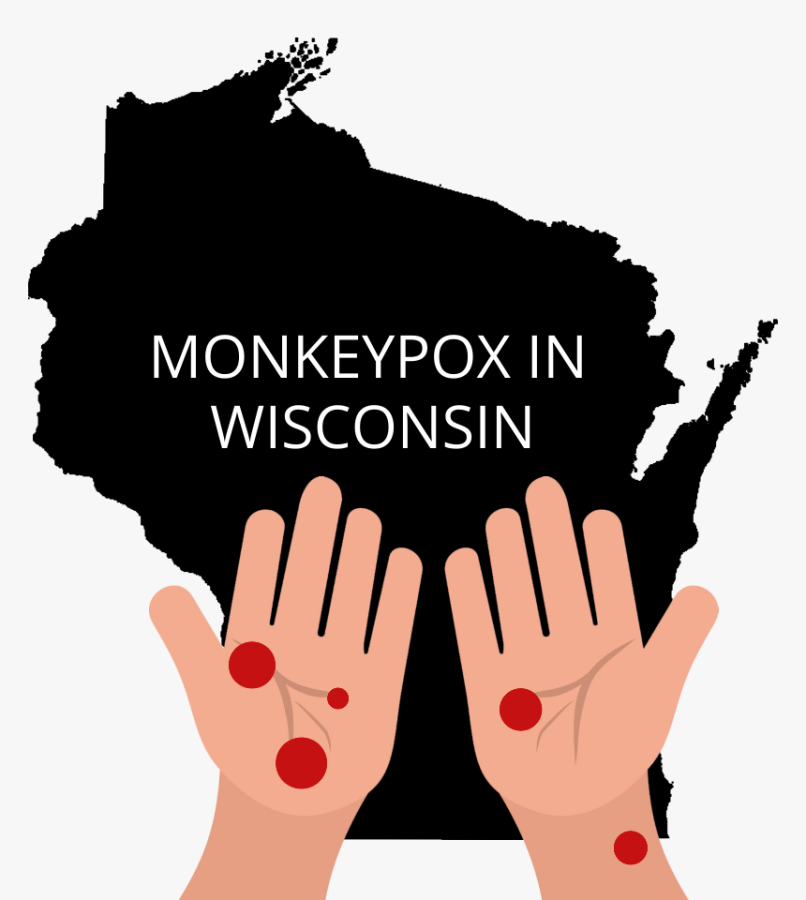What you need to know about monkeypox
September 6, 2022
After the peak of the COVID-19 pandemic, many Americans experienced “pandemic fatigue,” a natural response to prolonged isolation. However, with monkeypox entering the Fox Valley at the end of July, we must be hypervigilant once again.
There have been 18,989 documented cases of monkeypox in the United States since August 31st. Out of those, 60 have been recorded in Wisconsin, with some cases being right here in Winnebago County.
Here is what you need to know about monkeypox.
How does it spread?
Monkeypox is not a respiratory virus, but a virus spread by infections, typically spread by having physical contact with someone infected with it. Media coverage on the virus has been minimal, with many subtly pointing the blame towards members of the LGBT+ community. While it is true that the current outbreak of monkeypox has been affecting members of the community the most, specifically men who have sex with men, it is important to note that this virus can be spread in multiple ways and anybody can get the virus, regardless of their sexuality. Close contact with someone infected with the virus is how it spreads: close contact can mean hugging, cuddling, sharing objects with or touching the lesions of an infected individual. Monkeypox can also be spread after attending an event that recently had a monkeypox outbreak. However, monkeypox can spread even when an infected individual is asymptomatic, which can make it difficult to detect the virus.
What are the symptoms?
According to the Centers for Disease Control (CDC,) monkeypox is a milder form of chickenpox. It is considered to be significantly less lethal than chickenpox as well —the current outbreak has resulted in no deaths in the United States. The virus can cause skin lesions, rashes, chills, fever, and rectal pain. Though it is a pox virus, it can cause respiratory symptoms such as cough, sore throat, and/or nasal congestion. However, the lesions that could form as a result of monkeypox can be painful and are usually itchy as they crust over. They can initially look like blisters or pimples. A rash may circle around the lesions, or it may occur in other parts of the body. It’s possible that an infected individual might not even get lesions or rashes at all. Monkeypox can look different in everyone, which can make it difficult to detect.
What should I do if I contract monkeypox?
If you catch monkeypox, there’s no need to worry as the CDC has been monitoring the outbreak closely, and there are ways to avoid spreading it. Symptoms typically last two to four weeks, so if you share a room with someone, make sure you isolate yourself from other people and animals. Do not share bed sheets, clothes, or utensils and wash them thoroughly. If you need to leave your quarantine area for any reason at all, make sure to wear a mask and wash your hands frequently; avoid touching anything, if possible.
If you develop lesions, putting bandages or gauze over them will prevent the virus from traveling outside of the host. Taking oatmeal baths can help treat especially painful lesions, according to the Cleveland Clinic, Typical over-the-counter medications such as Tylenol and Advil can help ward off pain and symptoms of fever. Getting vaccinated against monkeypox is also strongly recommended by health officials.
What should I do if I live with someone who contracts monkeypox?
You may not get monkeypox even if someone in your household has it. With proper precautions, the virus may be contained by the host. However, if you need to provide care for someone with monkeypox, make sure you wear personal protective equipment such as gloves and masks. Wash your hands thoroughly after caring for an infected person. If bed sheets, clothes, or dishes have been used by an infected person, make sure to wash them thoroughly as well.
Chances are good that monkeypox will not have such a disastrous effect on the world like Covid-19 did, but regardless, monkeypox is not a virus you want to get. By following a few simple and easy precautions, our community can avoid the rise of another pandemic.


